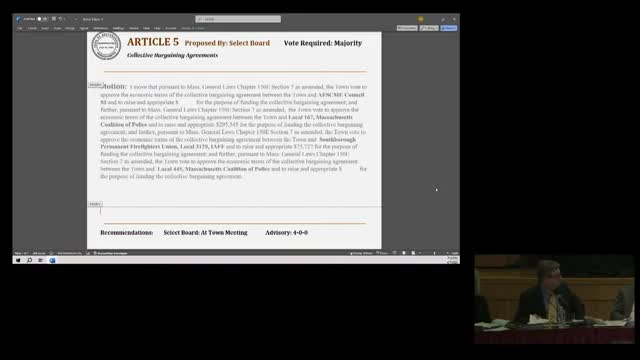Town Meeting approves budgets, contracts and capital items; multiple zoning and project articles fail or are postponed
Get AI-powered insights, summaries, and transcripts
Subscribe
Summary
Southborough voters moved through a packed warrant at the 2025 annual town meeting, approving operating budgets, select appropriations and several capital items while rejecting or postponing several zoning and petitioned articles after extended public debate.
Southborough voters moved through a packed warrant at the 2025 annual town meeting, approving operating budgets, select appropriations and several capital items while rejecting or postponing several zoning and petitioned articles after extended public debate.
The town cleared a multi‑part budget package after the consent‑list process and several holds. Moderator Paul Cimino and Town Clerk Jim Hegarty ran the votes and the meeting disposed of most unheld budget lines by a voice/hand count with subsequent held items taken separately. The meeting approved the wrap‑up appropriation moving forward the FY26 spending plan.
Collective bargaining and personnel actions: Select board representative Andrew Dennington presented Article 5, which funded the first‑year costs for recently ratified collective bargaining agreements with four town unions. The article included the following appropriations and descriptions presented on the floor: • $29,832 to fund the DPW agreement; • $295,545 for the police agreement (including a market adjustment effective 07/01/2025 aimed at improving recruitment and retention); • $75,727 for the firefighters union; and • $82,028 for dispatch. Dennington told the hall the police contract included a 7% market adjustment effective July 1, 2025 and dispatch included retention bonuses tied to an anticipated regional dispatch transition; the motion to fund the contracts carried.
Budget and capital votes: The meeting approved the town’s FY26 budget package (Article 6) after multiple holds and a set of line‑item votes. Separately, voters approved Article 7 to appropriate water enterprise fund operations and Article 10 (non‑borrowing capital items). The meeting also approved Article 13, authorizing the town to seek an interest‑free loan from the Massachusetts Water Resources Authority to replace aging water main on Lindbergh Road (a two‑thirds vote required and achieved). Article 14 — borrowing to repair critical culverts on Willow Street and John Mitchell Street — passed on a two‑thirds vote after proponents described flood‑closure risks to truck traffic and local business access.
Other actions and outcomes: • Article 9, a request to close out borrowing for Breakneck Hill cleanup work, was moved to indefinite postponement after conservation and stewardship committee members said restoration details and costs remained to be finalized. • Article 15 (authorization to lease specified capital equipment as a capital lease) passed. • Article 26, a Community Preservation appropriation to restore the iron railing and granite posts around the town common, passed. • Article 27 transferred $532,014 from CPC reserves to the newly formed Affordable Housing Trust; town meeting approved the transfer to allow the trust to act on time‑sensitive acquisitions and initiatives. • Zoning Articles 29 (rules for special ADUs >900 sq ft) and 28 (zoning updates to align with recent state ADU law) were extensively debated: Article 29 failed on a two‑thirds vote and Article 28 was subsequently indefinitely postponed. • Article 30 (allowing shared commercial parking under planning board review, with restrictions) passed. • Article 33 (technical change to senior tax work‑off eligibility and process) passed. • Article 36 (authorize trust fund investments under a prudent‑investor standard) passed. • A citizen petition (Article 37) seeking a town study of the Breakneck Hill cleanup and related accountability measures did not carry.
Why this matters: Voters approved the budgets and several capital and borrowing measures that set services, staffing and infrastructure priorities for the coming fiscal year, while rejecting or delaying several regulatory and petitioned items that generated substantial public debate.
What’s next: Town staff will implement the appropriated budgets and capital projects; planning and zoning boards will review the failed/postponed zoning proposals and may return revised articles to a future town meeting. The select board and Affordable Housing Trust will report on funds transferred and any acquisitions or programs created using CPC money.
